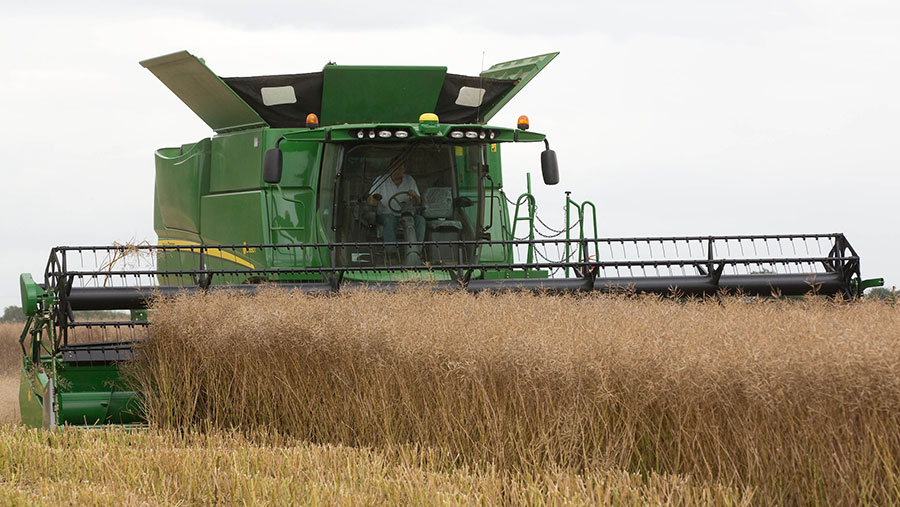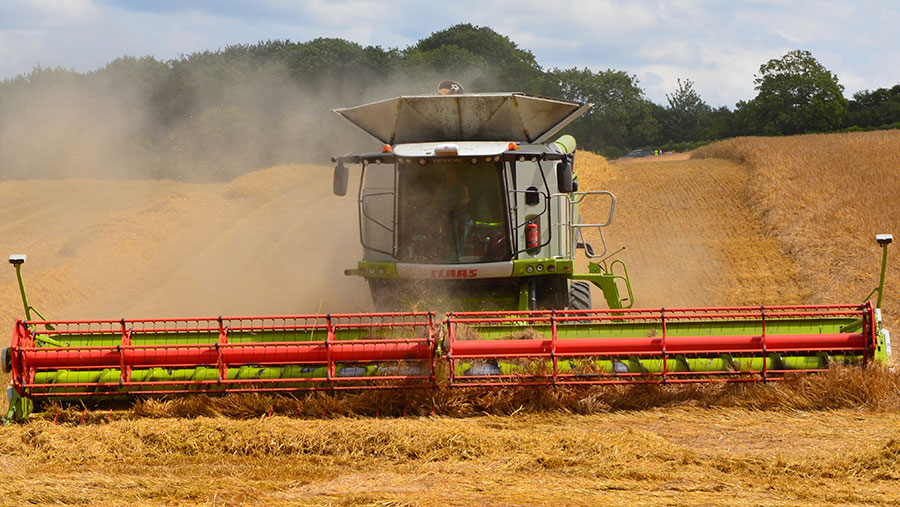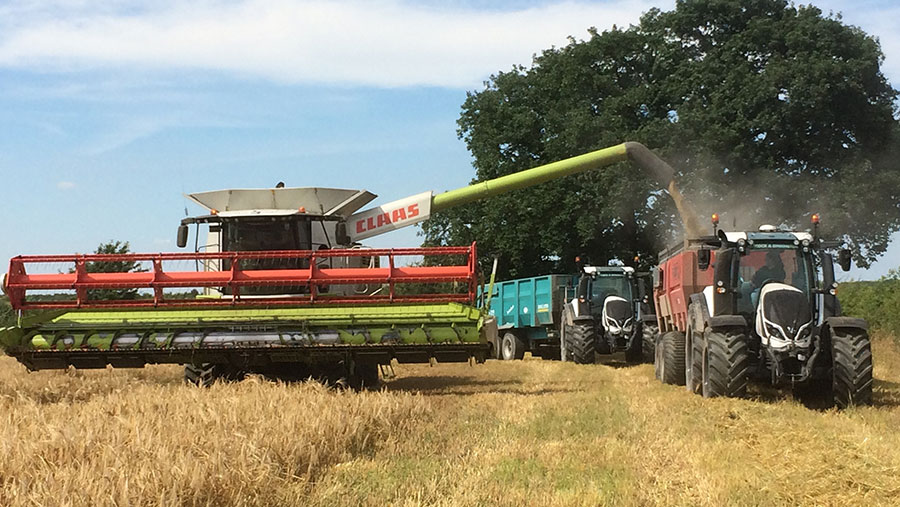Harvest 2017: Drought hits crop yields on lighter land
 © Tim Scrivener
© Tim Scrivener The winter barley and oilseed rape harvest is making steady progress across England with growing evidence the drought earlier this year is proving costly in terms of yields and quality.
Crops are varying widely, with results being highly dependent on soil type with crops on heavier soils performing best.
See also: Harvest 2017: Early rapeseed yields better than expected in dry year
Many areas of the UK experienced a bone-dry spring, putting crops under stress, followed by high temperatures in June, leading some crops on light land to die on their feet.
Wiltshire
In Wiltshire, Martin Smart has cut about 243ha of winter barley at P&J Awdry and Son’s Ashton Farms, Trowbridge, with extremely mixed results.
“We’ve cut Hyvido Belfry and Galation, and it ranged from 6.8t/ha on stony brash soils, where it just died on its feet, to 9.3t/ha on heavier land,” he said.
“You could see the outlines of all the old medieval villages and hedge rows when combining – it was like flying a drone.”

This picture posted on the Farmers Weekly Harvest 2017 gallery by “jam-esh” shows a combine cutting laid down winter barley in East Dorset © jam-est/www.fwi.co.uk
The crops were extremely dry and dusty, coming off at 11.5-14% moisture, even after this week’s rain.
“The straw is really variable, as is the sample. The grain was a dirty, dark colour on the light land but lovely and golden on the heavier soil,” explained Mr Smart.
Specific weights were reasonable, at 64-65kg/hl, although some samples needed cleaning, he added.
Having sprayed off the oilseed rape, Mr Smart expected to start combining that next week. “We’ve got Alizze and Harnas entered for the Yield Enhancement Network and it looks absolutely stunning. I can’t wait to cut it and will be really disappointed if it doesn’t yield well.”
Essex
Catana oilseed rape has proven extremely variable at Rectory Farm, Saffron Walden, Essex, where Peter Wombwell has also cut 81ha of Tower winter barley.
“We had some rapeseed doing 3.84t/ha and some down at 2.5t/ha,” he said. “The cold start and drought really punished the crops on the lighter sandy land, but yields are better on the stronger soil.”
The winter barley had come off at between 6.5t/ha and 8.7t/ha, with specific weights averaging 66-67kg/hl.
“We’ll be into some winter oats next week – it’s been a very early start and everyone is just nibbling away at bits and pieces,” he added.
“The wheat has lost a lot of tillers, so I just hope the bushel weight is going to be there. It’s not going to be a vintage year: There haven’t been any highlights yet.”
Cambridgeshire
The drought has also taken its toll at Henry D’Abo Farming’s West Wratting Park Estate, Weston Colville, Cambridge.
“The Cassia winter barley yielded 6.5t/ha which is quite a bit below the four-year rolling average,” said farm manager Ian Ashbridge.
“There’s no doubt it will have aborted the odd tiller.”
However, specific weights were good, at more than 70kg/hl, and it was all dry in the barn at 13.5% moisture.
Elgar oilseed rape was also in the barn – possibly the earliest cut in the district, he added. That yielded 3t/ha.

This picture posted on the Farmers Weekly Harvest 2017 gallery by “Gulham” shows a combine emptying winter barley for PT Moore and Partners, North Owersby, Lincolnshire © Gulham/www.fwi.co.uk
“We’re spraying off marrowfat peas tomorrow so they’ll be ready in two weeks, following by winter wheat, which looks well – the Lili looks particularly impressive.”
Kent
In Kent, Robert Shove had lost a lot of his oilseed rape to drought at Lillechurch Farm, Lower Higham, Rochester, and had only just desiccated the remainder. “We’ll be into it in a couple of weeks,” he explained.
Cotswolds
Further west, Ian Branstone was also waiting to start combining at Bourton Hill Farm, Bourton-on-the-Water, Gloucestershire.
“It all looks fantastic, but I think the oilseed rape and winter barley is going to be ready at the same time,” he said. “It’s ready to go now, we’re just waiting for it to dry out a bit.”

